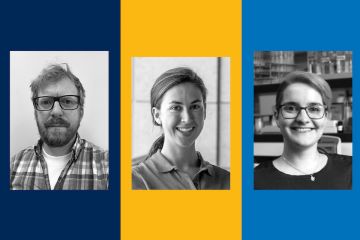A whole different ball game
- Alyssa Hindle

It’s game day. Your team steps onto the court ready to pass, shoot and score. As the game begins, you tune into the sound of the ball ringing on each kick and hear your teammates calling out their locations. You must listen and run carefully because you’re blindfolded. This isn’t your average soccer game—it’s blind soccer.
With several sessions held during the summer, drop-in blind soccer at UVic is a student-led success story.
The sport was brought to UVic by Exercise Science, Physical and Health Education students Lindsay Webster and Radoslaw Wiechecki. Last year, they were assigned a class project that involved raising awareness about adapted sports and recreation. They learned that in the 2015 Parapan Am Games, blind soccer was the only sport that lacked a Canadian team. They also discovered that there were no blind soccer opportunities available locally. But instead of focusing on a different activity, the pair decided to do something about it. With approval from their professor, the students changed their project’s focus, from simply raising awareness to actually establishing a new blind soccer program in Victoria.
Webster and Wiechecki approached CanAssist, the UVic organization that develops innovative technologies and programs for people with a wide range of disabilities. CanAssist brought Vikes Athletics and Recreation to the table and together they were able to book a recurring timeslot over the summer months.
Around the same time, a separate course at UVic hosted a guest lecture from BC Blind Sports on how to facilitate sport programming for people with vision impairments. Webster and Wiechecki were granted permission to attend the class, picking up tips from the experts and even managing to receive a donated audible ball from the organization. The students also approached a UVic alumnus, who donated a set of audible balls to facilitate the large number of participants who attend the drop-in sessions.
“The Victoria blind soccer program has allowed me to give back to the community that has done so much for me,” said Webster, who graduated with a kinesiology degree last year. “It means a lot more than words can describe because it combines all of what I consider the most valuable components of my degree: healthy living and inclusive and adaptive physical activity.”The drop-in blind soccer program is held in an indoor ball hockey arena, helping to keep both the ball and players in bounds. An audible soccer ball, with bells inside, enables players to zero in on its location. The program exemplifies the essence of true inclusion: everyone has the opportunity to participate in the same way. Whatever a person’s level of vision off the court, everyone—save for the goalies and a few scouts—is completely “blind” during the game.
This fall, drop-in blind soccer continues at UVic’s Centre for Athletics, Recreation and Special Abilities (CARSA). Everyone on and off campus is welcome.
“Not only am I extremely grateful for everyone who has helped make it possible, but it was a very memorable end to my studies at UVic,” Webster said.
Adapted sports and recreation at UVic: a few facts
Adapted activities sometimes go by the names accessible, inclusive or adaptive sports and recreation. Typically, they describe activities featuring special equipment, rules or other modifications to allow people with disabilities to participate.
At UVic, adapted sports and recreation are open to all members of campus and the community, whatever their level of ability.
For example, blind soccer can be played by everyone—regardless of a person’s vision. All players must wear full blindfolds, except goalies and a few scouts.
Other adapted activities at CARSA include wheelchair tennis, accessible dance, wheelchair basketball, and adapted strength and conditioning.
Wheelchair sports are not just for people who regularly use wheelchairs. In fact, many wheelchair basketball athletes can walk.
Para Sports are defined as “parallel sports”—they are not simply modified versions of their able-bodied counterparts, but are often unique sports, with unique equipment unique rules.
Photos
In this story
Keywords: adaptive technology, exercise, inclusion, athletics, student life, community, exercise science







